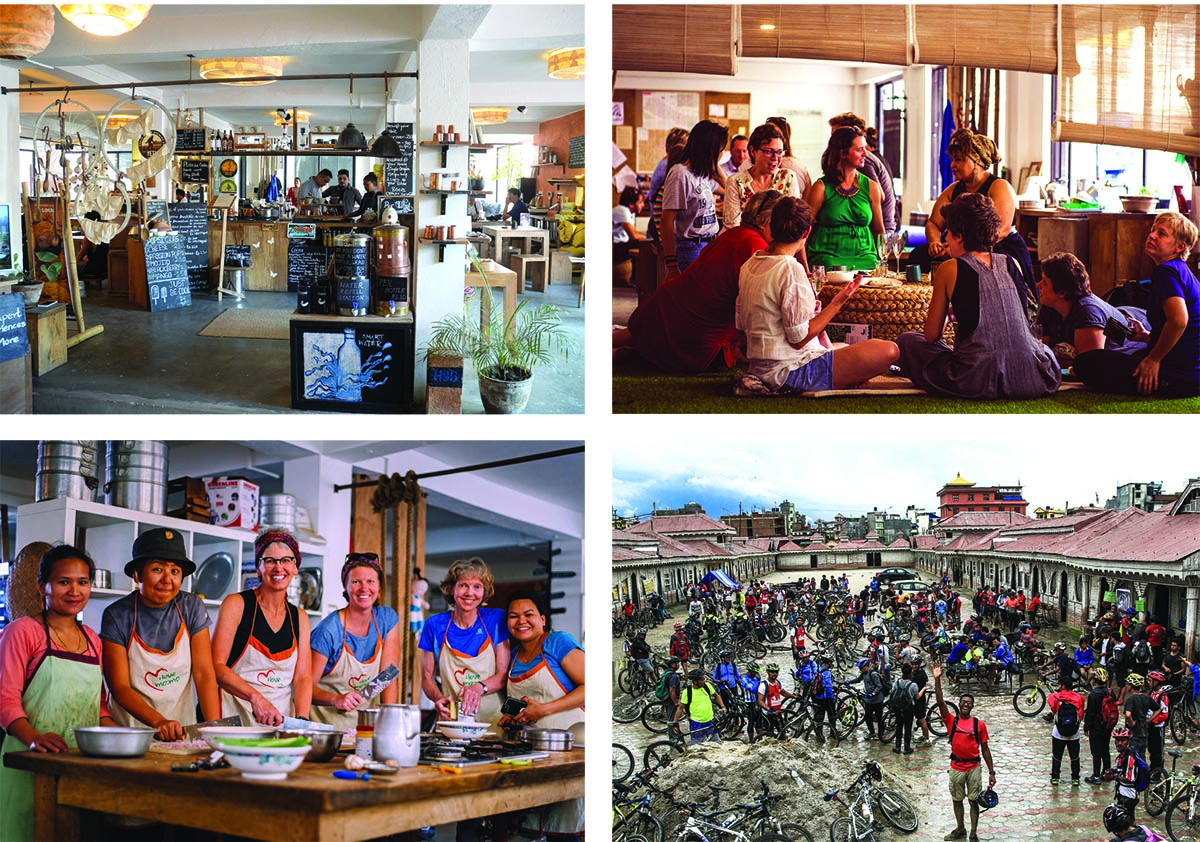
Text by Sajeet M. Rajbhandari
Photos: Social Tours
For a business scene where the market has been saturated with an excess of travel agencies and tour companies, Social Tours is an enterprise that has managed to separate itself from this congestion of mediocre profit-centric model of travel companies. Social Tours has made a home for itself within a cozy little coffee shop in Jyatha and works on the strong premise of social responsibility while delivering to its clients an experience of a lifetime. Finding life through social cause, here’s all that Social Tours has been doing right since 2002.
The origin
Back in 1998, while Raj Gyawali, the founding director of Social Tours, was working in trade and export he had the opportunity to cater a tour for a bunch of students from the U.K. Gyawali and his partner relied on a cost-plus model through which they were able to use the profits to build a hostel for a school in Helambu and conduct a cataract eye camp with Tilganga hospital. “I discovered a new side to tourism,” tells Gyawali. “I felt that tourism and social work seems to go together.” Hence, the idea of ‘Social’ coming together with ‘Tours’ became a reality in 2002 as Social Tours, a business that incorporates the spirit of social responsibility, benefits not just itself and its clients but also the society.
However, Gyawali states that once you do start a travel company, relying solely on the cost-plus model wasn’t ideal. “Being a company, you need to start looking at making profit all the while benefitting the society,” explains Gyawali. He proudly talks about how Social Tours is one the few businesses globally to have started out with deep rooted principles of community service ingrained into the company’s philosophy unlike most other organisations that think of corporate social responsibility only later down the line. “Our company runs on a very simple system of values: respect, control of greed, honesty and integrity, social responsibility, deliverance of quality and environmental consciousness,” shares Gyawali. When Social Tours was still taking baby steps, there were a handful of key principles that flowed into the company and these principles in turn have shaped what it has become. Principles that included being responsible in tourism, businesses playing an active role in society, and the idea that businesses are like humans and should have values - all played a part in giving Social Tours the push it needed and paved the direction the company moved towards.
Sustaining a social entreprise
So how do you take a social cause and incorporate it into a profitable venture? According to Gyawali, the process of running a successful social enterprise isn’t very rigid, it actually flows around the determination that something can be achieved. “You need to have a sort of hard-headedness to prove a concept,” believes Gyawali, “We wrote down a mission that said ‘Social Tours wanted to prove a concept of linked prosperity.’ A simple statement that meant that it’s not just the shareholders who make money.” The company calls this way of belief, ‘Simple Focus’, having one mission and pooling in all your efforts to make that one mission work.
Another key course of action that Social Tours realised was to take one step at a time. “I am not a big believer of building massive business plans and imagining things. I’d rather try it out and see if it works,” shares Gyawali. “There is a lot of humility in knowing that some things work and some things don’t.” For Social Tours, keeping a finger on the pulse of the market plays a substantial role. Doing so allows them to identify what is happening in the market and where the movements are once they do that, they are able to fit ideas and concepts that they develop into the market and test it out in the real world.
Gyawali and the Social Tours team also link their prosperity to the country itself. According to Gyawali, “In Nepal the entry into business is very simple. It isn’t expensive and doesn’t usually involve a massive amount of cost.” This meant that as a young business, Social Tours could afford to try out new things and then layer these things one on top of the other. Another key ingredient for a business in Nepal is patience. “What businesses really require is financial patience,” explains Gyawali, adding, “If you make massive investment, your financial patience goes down because you’ll need immediate returns. But if you have small investment, you can actually weight it out.” Gyawali feels that abiding this technique lets Social Tours expand itself slow but steadily, one layer at a time.
The experience
“We thrive to offer a very personal service that is both knowledgeable and professional,” tells Gyawali who defines Social Tours as a custom tailoring service for trips. Social Tours believes that it is necessary for trips to be designed to a person’s specific needs and the seasonal specialties that a place might have. Social Tours have designed trips that cater towards specifically meeting and seeing artisans in and around the city or trips that are planned with discovering new food in mind. “This is our niche,” says Gyawali, “Knowledgeable, offbeat, sustainable and personal.”
When asked about what kind of clientele they enjoy, Gyawali says, “There are more and more people looking for experiences. People from anywhere between 25 to 65 year olds who have an interest in going deeper. I think the demographic we target cannot be classified exactly as male or female, or on the basis of age but rather people who want to look at Nepal on a deeper level,” believes Gyawali.
While any travel company can manage hotel bookings and travel tickets, what sets Social Tours apart is the experiential aspect of travel they emphasise on. “We want travelers to look at Nepal from a deeper perspective,” he adds, “We want travelers to have the opportunity to understand the Nepali psyche.” In fact, the company has a series they call ‘Go Local.’ From local cooking courses and food trails to visiting and learning how a social enterprise in Kirtipur works, this series comprises of a wide range of plans that work to introduce and assimilate tourists to the local culture and norms.
Growing the brand
“The growth has been very organic,” mentions Gyawali, “We have never believed in revolutionary growth and have enjoyed a steady curve going up.” As times have changed, Social Tours has been able to redefine their products. However, the industry has changed dramatically with far more players in the game today, while the world has become smaller.
Competition isn’t limited within just the country anymore but also from outside where the urgency to attract travelers has become even more significant. “Travelers are going to other countries and we need to gather them here (Nepal),” tells Gyawali, “The way people get their information has changed. Earlier people would find out information from a brochure but now everything needs to be in an app.” This, paired alongside the increase in competing companies, has led to a dilution and murkiness that discourages unique products.
“But a favorable change for us is that more and more travelers now -be it millennials or gen Z’s- are all looking at experiences. They don’t want to travel, they want to experience. Even if it’s just for Instagram points, they want to be able to say that they experienced something,” shares Gyawali, “This has been a positive thing for us.”
Growth, however, shouldn’t be just seen as economic growth. For Social Tours, socio-cultural growth is also an important part of their ethos. From little things like social responsibility in the workplace, the company is working to set an example of how a corporation should function; be it through emphasising on gender equality in the workplace, or looking at geographical sustainability within the organisation, or even avoiding hierarchies at the office.
“We’re trying to become a role model for the world. Not just becoming one company in Nepal that’s doing something, but something that is for the world,” Gyawali boldly states. He goes on to add, “It is something a bit broader than saying ‘I am doing my little thing’, it’s about looking at the bigger picture.”


